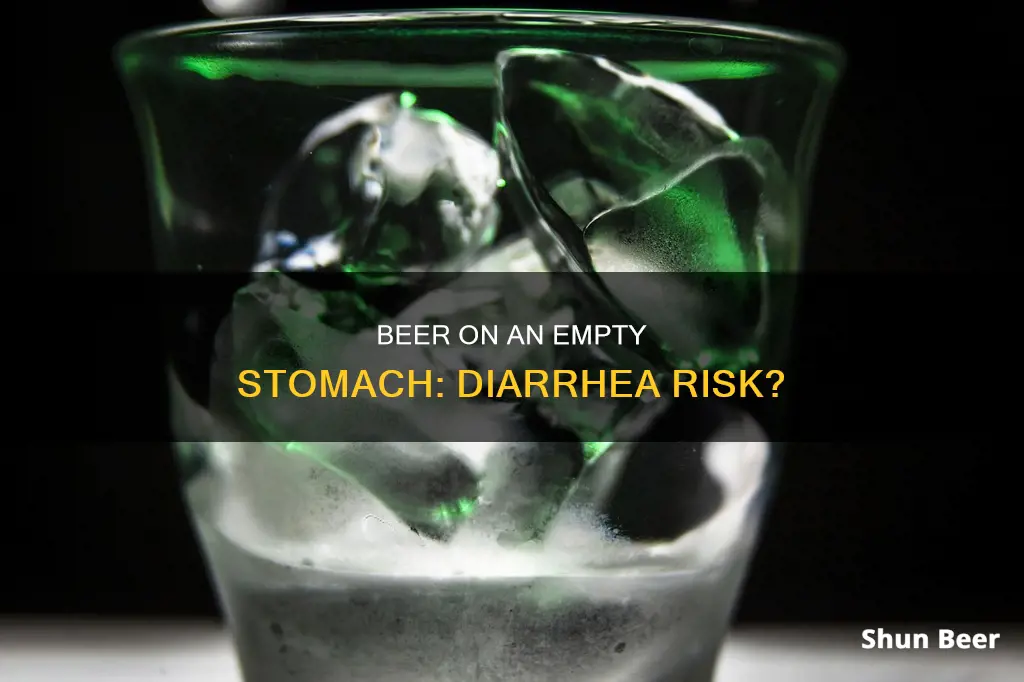
Alcohol can have a significant impact on the gastrointestinal tract, and drinking on an empty stomach can make the effects worse. Alcohol can irritate the lining of the gastrointestinal tract, causing inflammation and speeding up digestion. This can result in nausea, an upset stomach, and diarrhoea. The more alcohol is consumed, the more likely these effects are to occur.
Drinking on an empty stomach means there is no food to act as a buffer, slowing the absorption of alcohol. This can lead to faster intoxication and more severe gastrointestinal symptoms. Additionally, the large intestine may not be able to absorb water properly, leading to dehydration and loose stools.
To reduce the risk of diarrhoea, it is recommended to avoid drinking on an empty stomach and to consume plenty of water to stay hydrated.
| Characteristics | Values |
|---|---|
| Alcohol on an empty stomach | The effects of alcohol worsen if consumed on an empty stomach. |
| Alcohol absorption | Alcohol enters the bloodstream as soon as it is consumed. |
| Food as a buffer | Food in the stomach acts as a buffer, slowing the rate of alcohol absorption. |
| Inflammation | Alcohol triggers inflammation in the gastrointestinal tract, leading to increased acid production in the stomach, which can result in diarrhea. |
| Water absorption | Alcohol affects the large intestine's ability to absorb water, leading to liquid stools and dehydration. |
| Faster digestion | Alcohol agitates the intestines, speeding up digestion and resulting in diarrhea. |
| Bacterial imbalance | Alcohol kills healthy gut bacteria and allows unhealthy bacteria to grow, leading to intestinal malfunction and diarrhea. |
| High sugar content | Alcohol is high in sugar, which triggers an osmotic effect in the gut, increasing water and electrolyte secretion, resulting in loose bowel movements and diarrhea. |
| Gluten-related allergic reactions | Alcohol containing gluten can trigger allergic reactions, leading to gastrointestinal reactions, including diarrhea. |
| Poor lifestyle choices | Binge drinking, drinking on an empty stomach, irregular sleep schedules, and an unhealthy diet increase the risk of diarrhea. |
| Alcohol intolerance | Alcohol intolerance occurs when the body has difficulty processing alcohol due to lower levels of alcohol dehydrogenase (ADH) and aldehyde dehydrogenase (ALDH). |
| Gastrointestinal or bladder diseases | Pre-existing gastrointestinal or bladder health issues increase the risk of diarrhea after drinking. |
| Dehydration | Alcohol-induced diarrhea can lead to dehydration, which can become life-threatening if untreated. |
What You'll Learn

Alcohol irritates the stomach lining
Secondly, alcohol can affect the normal functioning of the digestive system, including the intestines and large intestine. It agitates the intestines, causing them to speed up digestion. This results in the colon muscles contracting more frequently and pushing stool out faster than usual, leading to diarrhoea. Alcohol also interferes with water absorption in the large intestine, leading to looser stools.
Additionally, alcohol can cause a bacterial imbalance in the intestines, killing off some bacteria species or allowing others to grow rapidly, leading to intestinal malfunction. People with irritable bowel syndrome (IBS) or other bowel diseases may be more susceptible to alcohol-induced diarrhoea.
To mitigate these effects, it is recommended to avoid drinking on an empty stomach. Having food in the stomach slows down alcohol absorption and reduces its direct contact with the stomach lining. It is also important to drink in moderation and follow low-risk drinking guidelines, such as those provided by the UK Chief Medical Officers, to minimise the potential harm to the stomach and digestive system.
The Magic of Mr. Beer Kit: Brewing Simplified
You may want to see also

Alcohol is high in sugar
Drinking alcohol on an empty stomach can lead to various adverse effects on the gastrointestinal tract. Alcohol can irritate the lining of the gastrointestinal tract, causing symptoms such as nausea, an unsettled stomach, and even diarrhoea. Consuming alcohol without eating food can also increase the risk of low blood sugar, especially for those with diabetes, as the liver stops releasing glucose while processing alcohol.
Alcoholic drinks are often high in sugar, which can have several negative impacts on health. Firstly, sugar is high in calories, and consuming too much can lead to unhealthy weight gain, increasing the risk of long-term health problems such as heart disease, certain types of cancer, and type 2 diabetes. Sugar is also the main cause of tooth decay, which can lead to cavities if untreated. Alcoholic drinks are responsible for a significant proportion of the sugar consumed by adults, and many people forget to factor this into their daily intake. All alcoholic drinks contain some sugar, but fortified wines, sherries, liqueurs, ciders, and pre-mixed drinks like alcopops have particularly high levels. For example, a pint of cider can contain up to five teaspoons of sugar, and the drink with the highest sugar content in a 700ml pack contains more than 15 teaspoons of sugar.
The high sugar content of alcoholic drinks can be especially problematic for people with diabetes. Alcohol can alter blood sugar levels, increasing the risk of alcohol-related diabetes and causing problems for those who already have the condition. When a person with diabetes drinks alcohol, their blood sugar can rise or fall, and the symptoms of low blood sugar can be similar to those of alcohol intoxication. This overlap of symptoms makes it harder to recognise when blood sugar reaches dangerously low levels. Additionally, alcoholic drinks such as beer and sweetened mixed drinks are high in carbohydrates, which can further raise blood sugar levels.
To maintain a healthy weight and manage blood sugar levels, it is important to track alcohol consumption and stick to recommended daily calorie intakes. Women should aim for around 2,000 calories per day, while men should aim for around 2,500. It is also recommended to avoid drinking on an empty stomach, as food helps slow down the absorption of alcohol and reduces the impact on blood glucose levels.
Beer After Its Best: Is It Safe to Drink?
You may want to see also

Alcohol triggers inflammation
Alcohol can cause inflammation in the body, which can have serious health implications. Chronic inflammation is linked to cancer, diabetes, heart disease, arthritis, Alzheimer's, and possibly depression. It is also associated with alcohol-related medical conditions, such as liver disease.
When you drink alcohol on an empty stomach, the rate of absorption is faster than when there is food in the stomach. This means that the alcohol will reach the intestines more quickly and can cause greater irritation and inflammation.
Dysbiosis
Alcohol disrupts the balance between "good" and "bad" bacteria in the gut, leading to a condition called dysbiosis. This imbalance negatively impacts the immune system and promotes the overgrowth of bacteria, further disrupting gut health.
Endotoxins
Dysbiosis results in an increase in chemicals called endotoxins, which activate proteins and immune cells that promote inflammation.
Intestinal Permeability
Excessive alcohol consumption can cause the walls of the intestines to become "leaky" or permeable. This allows bacteria and their toxins to infiltrate the bloodstream and spread to other organs.
Inhibited Immune Response
Alcohol slows the intestine's immune response to harmful bacteria and suppresses molecules and cells that are essential to immune function. It also impairs the functions and interactions of organs like the liver and central nervous system, which normally help to reduce the harmful effects of endotoxins.
Joint Inflammation
Joint pain is another symptom often connected to alcohol-induced inflammation. This can be due to dehydration, as alcohol dehydrates the body, and up to 80% of cartilage is water. The gut bacteria imbalance and inhibited immune and inflammatory responses can also contribute to joint pain. Additionally, alcohol can increase uric acid levels in the blood, which can lead to permanent damage to joints, bones, tendons, and ligaments if left untreated.
RV Drinking Laws: Beer and Driving
You may want to see also

Alcohol affects gut bacteria
Drinking beer on an empty stomach can cause diarrhea because alcohol irritates the lining of the gastrointestinal tract. This irritation can cause nausea, an unsettled stomach, and diarrhea. Alcohol also prevents the colon from reabsorbing water, leading to looser stools.
Secondly, alcohol and its metabolites can overwhelm the gastrointestinal tract and liver, leading to damage within these organs. The metabolites created when the body breaks down alcohol can be toxic, causing a change in gut integrity or a "leaky gut." This leaky gut allows toxins from metabolizing alcohol to enter the bloodstream and cause damage beyond the gut, usually starting with the liver.
Thirdly, alcohol can cause bacterial overgrowth in the intestines, which leads to an increase in the release of endotoxins produced by gram-negative bacteria. Endotoxins activate proteins and immune cells that promote inflammation. Studies have shown that alcohol increases intestinal bacteria and that this overgrowth may be stimulated directly by alcohol or indirectly by poor digestive and intestinal function caused by alcohol consumption.
Finally, alcohol can affect the mucosal immunity of the gut by decreasing the innate immune response and triggering an immune system response, leading to the release of inflammatory immune cells. Overall, alcohol's impact on gut bacteria can have significant effects on overall health and increase the risk of various diseases.
Beer and Zyrtec: What You Should Know
You may want to see also

Alcohol intolerance
Drinking beer on an empty stomach can cause diarrhea because alcohol irritates the lining of the gastrointestinal tract. This irritation can cause nausea, an unsettled stomach, and diarrhea. Alcohol also prevents the large intestine from absorbing water, which results in looser stools.
- Facial redness
- Rapid heart rate
- Headache
- Low blood pressure
- Hives
- Runny nose
- Stomach pain
People of Asian descent are most at risk of alcohol intolerance, with 30-50% of East Asians experiencing this condition, but it can affect people of all races and ethnicities. Alcohol intolerance can lead to major health problems, including cancers of the mouth, throat, oesophagus, stomach, and liver. It is also associated with an increased risk of heart disease and stroke.
The only way to prevent the uncomfortable reactions caused by alcohol intolerance is to avoid alcohol or the particular substance that causes the reaction. For minor reactions, over-the-counter or prescription antihistamines may help reduce symptoms such as itching or hives.
Vintage Beer: Drinking Beer from 1996 and Beyond
You may want to see also
Frequently asked questions
Drinking beer on an empty stomach can irritate the stomach lining and cause inflammation, which can lead to diarrhea. It is best to avoid drinking on an empty stomach and to eat a meal or a substantial snack beforehand.
Beer contains gluten, and some people may be intolerant to it, leading to gastrointestinal reactions such as diarrhea. Beer also has a high carbohydrate content, which can be difficult for the body to break down and lead to diarrhea.
To prevent diarrhea after drinking beer, it is recommended to drink plenty of fluids, especially water, to stay hydrated and maintain electrolyte balance. Eating digestible foods that are easy to digest, such as crackers, toast, or rice, can also help soothe the digestive system.







